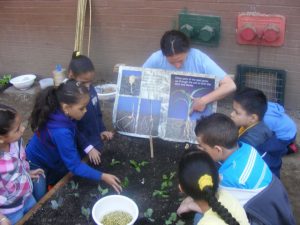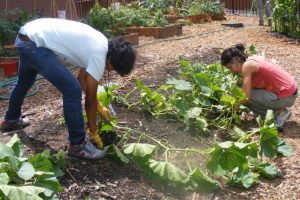By guest blogger Annie Spiegelman, a.k.a. the Dirt Diva.
Last month I had the privilege of signing copies of my new book, Talking Dirt, (Penguin Group, 2010) at the New York Botanical Garden in the Bronx. Am I shamelessly promoting my book here? Of course I am! But mostly, I want to tell the world about Bronx Green-Up. Bronx Green-Up is the community outreach program of the New York Botanical Garden that provides horticultural advice, technical assistance, and training to community organizations and schools. The folks at Bronx Green-Up have been busy transforming vacant, abandoned lots into community gardens for the last 20 years. So far, they’ve helped create an astounding 300 community and school gardens and urban farms throughout the Bronx.
At C.S. 211, in the Bronx, each class spends time outdoors picking, cleaning, and eating food it has planted with the help of the Botanical Garden staff. “I think that when children realize they can grow their own food, it is very exciting,” says Ursula Chance, director of Bronx Green-Up. “They’re tasting and eating food they grew. They also learn to recognize plants, and are now familiar with them.” School principal Betty Gonzalez-Soto considers it a “hands-on experience in getting healthy” and believes this program provides a lifetime of healthy eating habits. “Gardening gives children an alternative way of learning that broadens the school curriculum in a similar way to arts and sports,” says Rick Feldman, library teacher and garden enthusiast. “We’ve been gardening with our students for many years at C.S. 211 in a pocket park behind our school, in the middle of the Bronx. When we give children something they can do, they go after it with tremendous enthusiasm.”
And then there’s Jodie Colon, Bronx Green-Up’s very own “Compost Queen.” Colon and her staff teach composting classes at the Botanical Garden and at various community gardens. Colon, who is passionate about recycling food scraps, mixing them with garden waste, and putting the local earthworms to work, believes New Yorkers can easily handle a small worm bin in their apartments if they don’t have outdoor space for a full-sized compost bin. She’s even got a compost hotline in case you need urgent answers, called “The Rotline” (718-817-8543). When educating the public, she’s gentle and cognizant of those who are new to composting and may initially be afraid of worms. At her demonstrations she won’t open the cover to the worm bin until she asks for their permission. Once the visitors see how tiny the red worms are inside a worm bin, they can usually breathe again.
Being a native New Yorker, I can relate. Apparently New Yorkers don’t believe in nature…we don’t have time. And what New Yorker is going to believe that there are millions of microorganisms living in a spoonful of healthy soil? Plus, we seem to think that ALL insects are bad, forgetting the fact that insects have been on earth for over 400 million years. They’re here to stay. Of the 1 million insect species entomologists have identified, less than 1 percent are actually considered pests of agriculture. Most are beneficial for pollinating our fruits and vegetables, keeping the underground ecosystem alive, devouring other teeny insects, aerating soil, or breaking down waste in your backyard compost bin.
Ready to nerd it up? You can sign up now for the three-part series coming to the Botanical Garden in September entitled The Underground: Soil Is Alive! This hands-on course will teach you how to build and maintain healthy soil. I’ve said this before and I’ll say it again: If you’re going to grow anything in your garden, the first thing you need to know is how to grow healthy soil. If you don’t want to do that, you may as well pick another hobby like knitting or name-dropping. If you don’t start with good soil, you’ll just be wasting your time and money, and polluting the entire zip code spraying pesticides on all of those diseased plants that attracted pests, because you didn’t have proper soil. All you had was plain ol’ lifeless dirt. (Call 718-817-8026 to register for the series, or visit www.bronxgreenup.org.)
Right now through October 17th, The Edible Garden is the theme at the NY Botanical Garden. There are four kitchen gardens to view, cooking demonstrations every day, food & wine tastings, book signings, and celebrity-chef appearances. (To find out who’s cooking this week, text “NYBG CHEF” to 56512.) I was there during the worst heat wave of the summer, but I still had a fantastic time. You can catch the train from Grand Central Station and be there in 20 minutes. If you go on a Wednesday, the weekly farmer’s market is going on, so you can shop and support the local farmers.
Some other wormy numbers to know about in New York: Brooklyn Compost Project, at the Brooklyn Botanic Garden (718) 623-7290; Manhattan Compost Project, at the Lower East Side Ecology Center (212) 477-3155; Queens Compost Project, at the Queens Botanical Garden Botanical Garden (718) 539-5296; Staten Island Compost Project, at the Staten Island Botanical Garden (718) 362-1010. And www.nyccompost.org.







Great story! Students actually get hands-on experience in something that benefits them and their fellow classmates and they get to learn how it comes about as well. This should be a regular part of every school’s curriculum.
Clay Boggess
http://www.BigEventFundraising.com
I’m coming up on 3 years with my Can-O-Worms in my laundry room. I love showing it to all my visitors, big and small.
In the past I have also taught elementary aged kids how to sew, and it is a similar feeling…some kids have no idea they are capable of so much..we don’t HAVE to buy everything at Walmart, we can make it, grow it, fix it and enjoy the process along the way.
It’s exciting to here more and more of what NYBG is doing with food gardening…
You made some clear points there. I looked on the internet for the subject and found most guys will consent with your website.